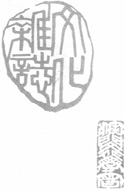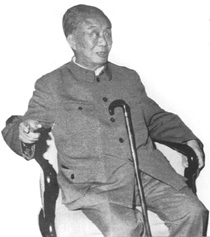R. C. is, to put it implicitly, a place for communication in order to assert and stimulate the cultural dialogue. What the writers write, to a certain extent, is a letter, and each reader feels that a message has been received.
(Thus it is felt that) many letters which are addressed to us, being objective and competitive, help to materialize our aim and these letters deserve a place in this magazine.
Coincidently, one of the letters we received is of consideration and of solidarity to the suggestion we made in our 1st. issue of attributing the Nobel Prize for Literature to the great Chinese poet, Ai Qing. The harmonious echoing voice of Jorge Amado and the solid support from the U. S. A. by Mrs. Mécia de Sena, the widow of the great writer, poet and critic Jorge de Sena, also proposes Ai Qing for the Nobel Prize for Literature.

To: Dr. Jorge Morbey
Instituto Cultural de Macau
"I am very happy to know that ICM is working for the nomination of Ai Qing to the Nobel Prize for Literature... In the past few years, the Chinese Government too, was in agreement that Ai Qing is worthy to receive this award"
I am a keen student of the poems of Ai Qing. I helped him and his wife in various editions, publishing over two scores of treatises. At present, I am writing two books with 800,000 characters that will be out for circulation in the ensuing year. There I have written about Ai Qing's departure to Macau. With great enthusiasm he referred to me his visit to Macau and the people responsible for his visit. Your Institute has just finished translating and publishing in Portuguese a selection of poems by Ai Qing. I would like to express my appreciation and offer my congratulations.
Also I am very happy to know that ICM is working for the nomination of Ai Qing to the Nobel Prize for Literature. All lovers of Culture and Art would not forget your intentions and efforts in this direction.
In the thirties some people had already proposed Lu Xun(魯迅) and Ai Qing for the Nobel Prize in Literature. In the past few years, the Chinese Government too, was in agreement that Ai Qing is worthy to receive this award. Even last August, the famous Brazilian author, Jorge Amado, during a banquet organized by the Department of Culture of the Peoples' Republic of China, expressed his opinion in public that the Nobel Prize for Literature should be attributed to the great poet, Ai Qing.
In my opinion, the Nobel Prize for Literature should go to an author who dedicates his life's works to peace and to Human Rights, to the happiness and joy of the people, to their prosperity, and in a creative and original style contributes to the aggrandizement of the art. Well, Ai Qing has all these attributes!
To know Ai Qing well, his position and influence in China and in the World and his success in the field of literature, I enclose herewith some reviews on him.
With best regards,
Peking, 4th August 1987.
Zhou Hong Xing
Professor of Ancient Chinese Literature, writer and secretary to poet Ai Qing.
To: Dr. Jorge Morbey
President of ICM
"Lately, the famous Brazilian writer Jorge Amado visited China.
In a banquet held on the 2nd August, he said: "A journalist asked me to whom the Nobel Prize for Literature should be awarded? I replied that it should be awarded to one of the three writers: one of them is a Brazilian writer, the other is a Cuban writer and the third is the great Chinese poet Ai Qing. If I were the member of the jury, I would have proposed the attribution of the Prize to Ai Qing".
I was very glad to read the text of "Revista de Cultura" that suggests the nomination of Ai Qing, the greatest contemporary Chinese poet, for the Nobel Prize in Literature. I fully support his candidature; the poet Ai Qing undoubtedly deserves to receive the Prize. Already in 1983, when the Spanish poet, Alfredo Gomez Gil, was teaching in the Academy of Foreign Languages, in Peking, this subject was brought forth. Gomez Gil is the Spanish translator of the book "Poems of Ai Qing", published last year in China.
I am sure some of the Chinese writers like Ba Jin (巴金)or Cao Yu(曹禺)could also have the qualities to stand as candidates, but poet Ai Qing should get the priority.
In an article written in the "Journal of Culture and Art", organized by the Institute of Chinese Authors and published on 18th July in Peking, a member of the Royal Academy of Switzerland affirmed that already in the thirties and the forties the jury had discussed the attribution of Prize to Chinese writers Lu Xun (魯迅), Ai Qing(艾靑)and Wen Ji Duo(聞一多).
Nevertheless, half the century went by and still not a single Chinese writer was awarded the Nobel Prize for Literature.
Lately, the famous Brazilian writer Jorge Amado visited China. In a banquet held on the 2ndAugust, he said: "A journalist asked me to whom the Nobel Prize for Literature should be awarded. I replied that it should be awarded to one of the three writers: one of them is a Brazilian writer, the other is a Cuban writer and the third is the great poet Ai Qing. I take this opportunity in wishing your Institute a great success (...).
With warm regards,
Kiang Zhi Fang
Peking, 15thAugust 1987
Dr. Morbey:
I thank you for having received the first issue of "Revista de Cultura" (in English), a most opportune and beautiful magazine. I have read in it the proposal of introducing the candidature of the Chinese poet, Ai Qing, to the Nobel Prize. I for one, frankly speaking, who know nothing of his works, will give you my full support on this question of principle.
It is absolutely unacceptable that two out of the five more widely spoken languages in the world, the Portuguese and the Chinese, have never been contemplated (with the Prize)(...)
This being so, I think it is worth raising this issue at least to mend an injustice in relation to China. If you feel I can be of any help and how, please let me know. I think it would be necessary to circulate a list of supporters in this respect.
Mécia de Sena
Mrs. Jorge de Sena
Santa Bárbara (California)
Professor of the Department of Foreign Languages of the University of Peking; Vice-Director of the Institute of Literature of Latin America.
Translated by João Libano

"It is absolutely unacceptable that two of the languages out of the five more widely spoken in the world, the Portuguese and the Chinese, have never been contemplated (with the Prize)(...)".
start p. 3
end p.